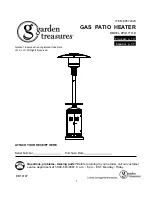
10
2.4
Maintenance
At least once a year, the heater will have to
be checked and cleaned by an expert, to
guarantee its good function.
Important advises
The heater must NEVER be put into
operation, with the cold water supply
turned off.
The heater must not be under pressure
nor voltage, in the course of a
maintenance.
2.4.1
Sacrificial anode
The service life of the anodes is determined
by the quality and quantity of the water
flowing through. That is why iet will be
recommendable to have the anodes
inspected, every year.
1. Turn off the cut-off cock of the feed pipe
of cold water.
2. Open the nearest warm water tap, to
eliminate the water pressure of the
heater and the water conduit.
3. Loosen the anode by the right key.
4. Inspect and replace it, whenever used off
by 60%.
5. Screw in the anode to be waterproof.
If the anode must be replaced, make sure
that the new one always will be of exactly the
same type. This can be checked by the type
of the heater, as well as by the complete
serial number.
2.4.2
Decalcification
The lime forming is a sequel of the quality
and the demand of the water. Besides, lime
forming will always be of a higher degree with
high water temperatures than with low ones.
Therefore, it is recommended to adjust the
temperature at 60 °C, so that the degree of
calcium precipitation can be kept at a low rate.
Decalcification will have to be done by using
appropriate means. If you need more detailed
information thereon, the relevant instructions
are available.
2.5
Measures to be taken at
moments of failures
Whenever there is a failure, the items given
below will have to be checked before calling
a trouble-shooting service.
2.5.1
Safety thermostat
Every heater has got a number of safety
thermostats interrupting the electric circuit, at
high water temperatures (95°C). These
safety thermostats cannot be reset but after a
decrease of the temperature by 20°C.
Subsequently, the regulating thermostat will
be checked: if it has been adjusted at a high
temperature, the thermostat will probably be
broken and must be replaced.
2.5.2
Water temperature not right
1. Check the adjustment of the regulating
thermostat.
2. Check whether there are leakages and/or
open taps.
3. Check whether the wiring is still correctly
connected.
4.
It’s possible that the consumption of hot
water is higher than it had been
calculated, originally.
5. Inspect whether the cold water inlet pipe
has got the right position.
2.5.3
Warm water temperature too high
Check whether the regulating thermostat is
set too high.
2.5.4
Probability of a water leakage
1. Check whether the drain tap is
completely shut.
2. Check whether the water connections are
waterproof.
Summary of Contents for EES - 30
Page 15: ...15 0313297 R0 ...


































